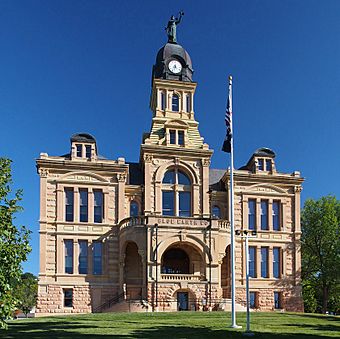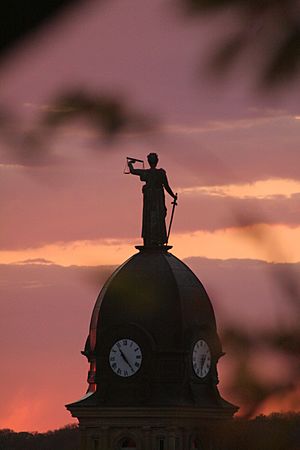Blue Earth County Courthouse facts for kids
Quick facts for kids |
|
|
Historic Blue Earth County Courthouse
|
|

The Blue Earth County Courthouse from the northwest
|
|
| Location | 204 S. 5th St., Mankato, Minnesota |
|---|---|
| Built | 1886–9 |
| Architect | Haley & Allen; Ring & Tobin |
| Architectural style | Late 19th And 20th Century Revivals |
| MPS | Blue Earth County MRA |
| NRHP reference No. | 80001940 |
| Added to NRHP | July 28, 1980 |
The Blue Earth County Courthouse is the courthouse of Blue Earth County, Minnesota, United States, in the city of Mankato, the county seat. It is listed on the National Register of Historic Places.
History
The building, completed in 1886, was the second courthouse in the county. The first courthouse in the county, a 20-by-24 foot one-story stone building, was built in 1857. It served as the location for the trial of 392 Dakota Indians after the Sioux Uprising. Thirty-eight Dakota people were simultaneously hanged in December 1862.
According to local Welsh-language poet James D. Price, whose Bardic name was "Ap Dewi", the first Eisteddfod held in Mankato took place at the Blue Earth County Courthouse on January 1, 1873.
By the late 1800s, the county commissioners felt that the previous buildings were a "disgrace and gave strangers that we were behind the times. That the county was either poverty stricken or greatly lacking in enterprise." The new building, designed by Minneapolis architects Haley & Allen, combined a Second Empire roof and dome with Italianate features. The stone was provided by a local quarry, with various techniques giving it both rusticated and ashlar surfaces. The copper-sheathed dome is capped with a statue of Lady Justice.


